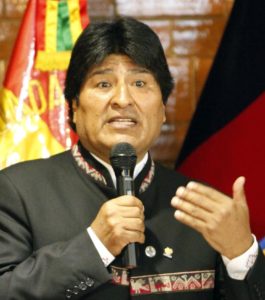Controversial Highway Approved in Bolivia
 Bolivian President Evo Morales approved a law authorizing the construction of a controversial highway through the Isiboro Securé National Park and Indigenous Territory on August 13. The decision enraged activists and the region’s indigenous communities.
Bolivian President Evo Morales approved a law authorizing the construction of a controversial highway through the Isiboro Securé National Park and Indigenous Territory on August 13. The decision enraged activists and the region’s indigenous communities.
The legislation repeals a previous law that granted the national park, also known as the Tipnis Region, “untouchable” status, safeguarding the people and land from development. These restrictions were won in 2011 after major protests rocked the streets of La Paz. Many members of Tipnis’ native Moxeño, Yuracaré, and Chimané communities feel betrayed by the government. Tipnis resident Ovidio Teco lamented the situation, saying “They lied, nothing more. After the march we thought the park would not be touched. This situation is all lies.”
The proposed Villa Tunari Highway would significantly simplify domestic shipping routes by connecting the Beni region of Bolivia to Cochabamba. The Bolivian Institute for Strategic Research, however, projects that the highway would destroy 64 percent of the area’s rainforest ecosystem.
The Villa Tunari Highway creates key ingress points for loggers and coca farmers. As Pablo Solón explained, “It’s not the road itself. It’s what comes with it. Coca producers will go and settle down and get new land inside the park. And after that comes, they take the wood, plant coca leaves, etc.” These industries already eat away at Tipnis’ dense rainforests to create fields for coca, which is traditionally used in the Andes as a mild stimulant and can also be illegally refined into cocaine.
